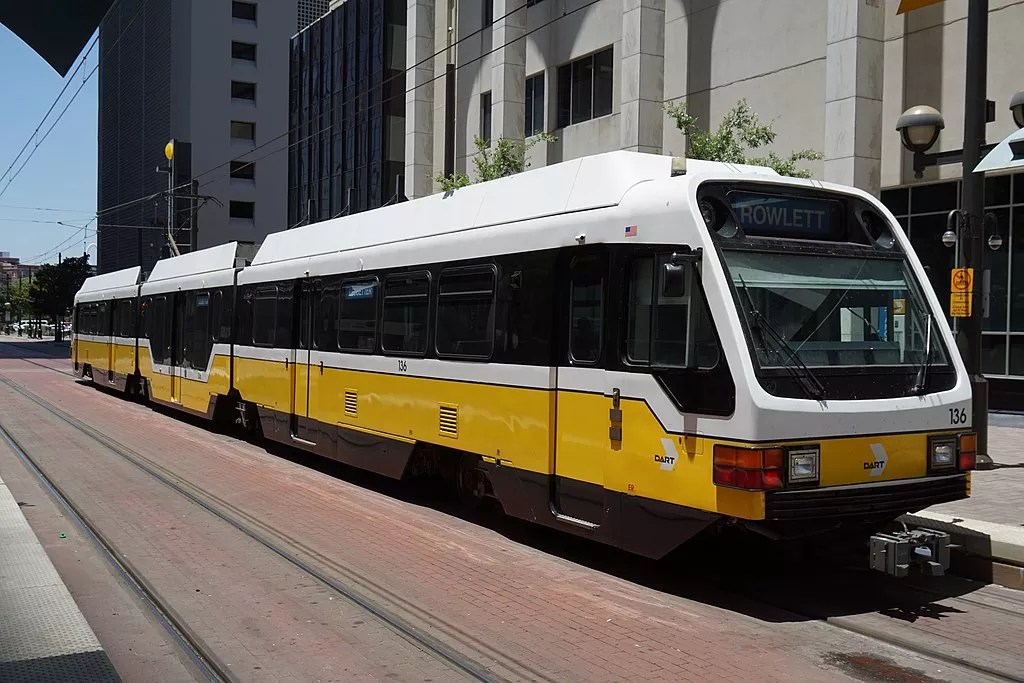
Michael Barera, CC BY-SA 4.0, via Wikimedia Commons

Audio By Carbonatix
Last week, the Dallas Area Rapid Transit (DART) system axed proposed changes that would have significantly affected disabled travelers reliant on the service’s paratransit system.
The changes, which would have nearly doubled the fees for curb-to-curb transportation and limited eligible transportation zones, were abandoned after significant pushback from the disabled community and their advocates at a public hearing in July. Lines of Dallasites who use wheelchairs were crammed into the waiting room and left to sit in the foyer for hours as the boardroom hit capacity early on that night.
“I have to speak for those that cannot at all, that would not put themselves out there,” Candace Wicks, a double amputee, said to the Observer after the July hearing. “There was no way that I could have missed that meeting. Looking at the other people that are affected just as much as I am, shame on me if I had stayed at home. When they don’t see us, they forget us.”
Paratransit service changes were just a few of several proposed by the organization. Other changes still being negotiated include separate fee changes for all riders, fixed route reduced stop frequencies, and the termination of several bus routes. However, the paratransit changes were the least popular of the proposed changes.
DART has been offering paratransit services in all of its member cities since 1986, according to its website. The transit system offers a better-than-standard service, offering curb-to-curb transportation for its entire zone, covering 13 cities, and costing $3.50 one way. But the proposed changes would have reduced service zones to the federal standards set by the Americans with Disabilities Act, which only requires paratransit services within three-quarters of a mile of all fixed routes and at a cost not to exceed double the regular fare. The cost per ride would have increased to $6.
Community Reactions
“I think it’s one of the most vulnerable parts of the community,” said Jesse Beck, a Preston Hollow father whose 25-year-old son is reliant on paratransit services to get to My Possibilities, a nonprofit offering continuing education courses to adults with cognitive disabilities. “And it was hard for that vulnerable community, per se, to have a voice to align, coalesce, and really have their input heard. I think it was amazing… I thought that was absolutely moving.”
Beck spoke at an information session before the public hearing to express his dissatisfaction with the changes and pointed out that lots of families would not be able to afford the rise in prices. Several community members reliant on the service, which is not reserved for the cognitively disabled, but also includes the visually and physically impaired, attended the pre-hearing sessions spread across the region to express their worries, and the outpour was unignorable, says Beck.
“First of all, I’m very appreciative of DART to actually listen to the community and people,” he said. “And not to say I was shocked. I was pleasantly surprised by their decision. But I think it goes to show the few and far between times where actually the people and the government agencies can actually listen and have a voice and actually have a decision that truly benefits the community.”
A representative of My Possibilities joined several of their students in July to speak out against the changes. The organization highlighted that the service changes would have made it increasingly difficult for many of their students to attend socialization and career-building courses.
“Coming together to fight for this population’s accessibility of transportation to their livelihoods and having those with the power to make the decisions hear, as well as understand the need, is a big step in the right direction,” Tripp Hemphill, health and safety manager at My Possibilities, said in an email. “We still have a long way to go in the way of making this world the best fit for those with disabilities, but this change in real time shows that the totem pole of people, from the top to the bottom, are starting to align in a way that signifies hope for a better future to all those who will need it one day.”
How We Got Here
DART has been at battle with the city of Plano since the municipality indicated it would elect to restructure its tax contributions to the transit service if given the opportunity. The state legislator representing Plano in the Texas House of Representatives has been vying to give his city that opportunity through a piece of legislation he has filed each session.
The bill would have allowed Plano and other member cities to redirect a quarter of the 1-cent sales tax collected by DART to a general fund that each respective city could use on other general mobility projects. The total losses for DART would have equated to billions of dollars and would fully derail ongoing projects and advancements to existing services, according to the transit service.
The bill, dubbed the DART Killer Bill, failed to make it to the House floor for a reading, but it did pass the Committee on Transportation, causing panic at the headquarters in Dallas.
As the DART Killer Bill progressed through the legislative process, DART started looking for new ways to save money while also appeasing some of the dissatisfied member cities. They created their new general mobility program (GMP), which includes the largest service cuts in history. The board of directors will cast a final vote on the GMP on Aug. 26. The GMP “redistribute[s] 5% of the agency’s annual sales tax revenue among seven member cities for a period of two years.”